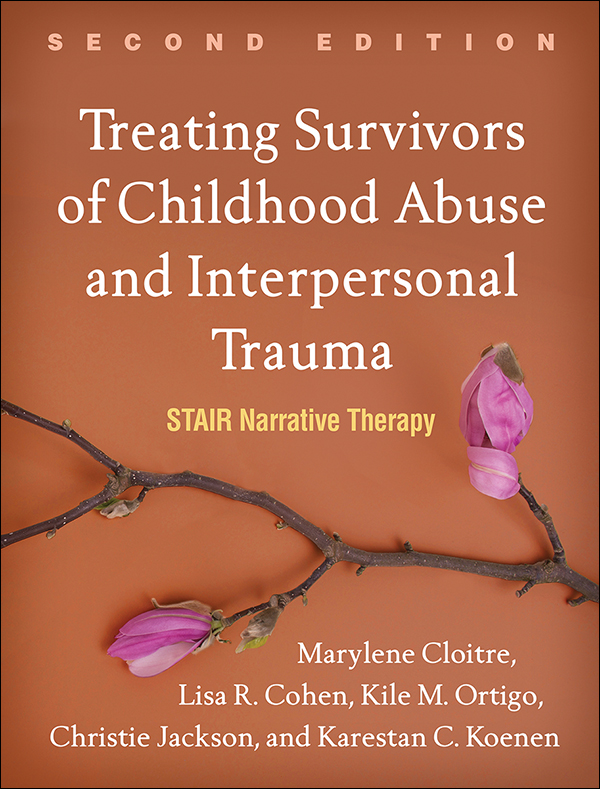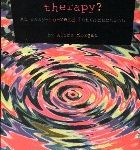Now revised and expanded with 50% new content reflecting important clinical refinements, this manual presents a widely used evidence-based therapy approach for adult survivors of chronic trauma. Skills Training in Affective and Interpersonal Regulation (STAIR) Narrative Therapy helps clients to build crucial social and emotional resources for living in the present and to break the hold of traumatic memories. Highly clinician friendly, the book provides everything needed to implement STAIR–including 68 reproducible handouts and session plans–and explains the approach’s theoretical and empirical bases.
The large-size format facilitates photocopying; purchasers also get access to a Web page where they can download and print the reproducible materials.
New to This Edition
- *Reorganized, simplified sessions make implementation easier.
- *Additional session on emotion regulation, with a focus on body-based strategies.
- *Sessions on self-compassion and on intimacy and closeness in relationships.
- *Chapter on emerging applications, such as group and adolescent STAIR, and clinical contexts, such as primary care and telemental health.
- *Many new or revised handouts–now downloadable.
- *Updated for DSM-5 and ICD-11.
Contents:
- I. Theoretical Frameworks
- 1. A Resource Loss Model
- 2. Attachment: When Protector and Perpetrator Are One
- 3. Development in the Context of Deprivation
- II. Foundations of Treatment
- 4. Treatment Rationale
- 5. Building Emotional and Social Resources: Overview of STAIR
- 6. Working with Traumatic Memories: Overview of Narrative Therapy
- 7. Extending the Narrative: Transforming Shame and Loss
- 8. Guidelines for Implementing Treatment
- 9. Assessment of Client and Match for Treatment
- III. STAIR Narrative Therapy, Session by Session – Module
- I. Skills Training in Affective and Interpersonal Regulation (STAIR): Building Resources
- 10. Session
- 1. The Resource of Hope: Introducing the Client to Treatment
- 11. Session 2. The Resource of Feeling: Emotional Awareness
- 12. Session 3. Emotion Regulation: Focus on the Body
- 13. Session 4. Emotion Regulation: Focus on Thoughts and Behaviour
- 14. Session 5. Emotionally Engaged Living: Distress Tolerance
- 15. Session 6. The Resource of Connection: Understanding Relationship Patterns
- 16. Session 7. Changing Relationship Patterns: Focus on Assertiveness
- 17. Session 8. Changing Relationship Patterns: Managing Power
- 18. Session 9. Changing Relationship Patterns: Increasing Closeness
- 19. Session 10. Self-Compassion and Summary of Skills Training – Module
- II. Narrative Therapy: Facing the Past and Imagining the Future
- 20. Moving from Skills Training to Narrative Therapy: How Do You Know Your Client Is Ready?
- 21. Session 11. Introduction to Narrative Therapy
- 22. Session 12. Narrative of First
- 23. Sessions 13-17. Narratives of Fear
- 24. Sessions 13-17. Narratives of Shame
- 25. Sessions 13-17. Narratives of Loss
- 26. Session 18. The Final Session
- 27. New Developments for STAIR Narrative Therapy References Index
Author Bio:
Marylene Cloitre, PhD, is Associate Director of Research in the National Center for PTSD Dissemination and Training Division, Palo Alto VA Health Care System; Clinical Professor (Affiliate), Department of Psychiatry and Behavioral Sciences, Stanford University; and Research Professor, Department of Psychiatry, NYU Langone Medical Center. Dr. Cloitre’s primary clinical and research interests are the developmental consequences and treatment of childhood abuse in adults and adolescents
Lisa R. Cohen, PhD, has maintained a private practice in clinical psychology in New York City since 2001. Dr. Cohen specializes in the treatment of trauma and stress-related disorders, as well as co-occurring anxiety, mood, eating, and substance use disorders
Kile M. Ortigo, PhD, is Program Director in the National Center for PTSD Dissemination and Training Division, Palo Alto VA Health Care System. Dr. Ortigo’s research and writing have largely focused on personality, trauma, adult attachment, and lifespan developmental models of self.
Christie Jackson, PhD, is Director of Clinical Training for webSTAIR, an online program based on STAIR. Since 2005, Dr. Jackson has maintained a private practice in clinical psychology in New York City. She formerly served as Director of the PTSD Clinics at the Manhattan and Honolulu VA Medical Centers.
Karestan C. Koenen, PhD, is Professor of Psychiatric Epidemiology at the Harvard T. H. Chan School of Public Health. She uses a developmental approach to understanding the epidemiology of trauma exposure and stress-related mental disorders such as PTSD and depression.





